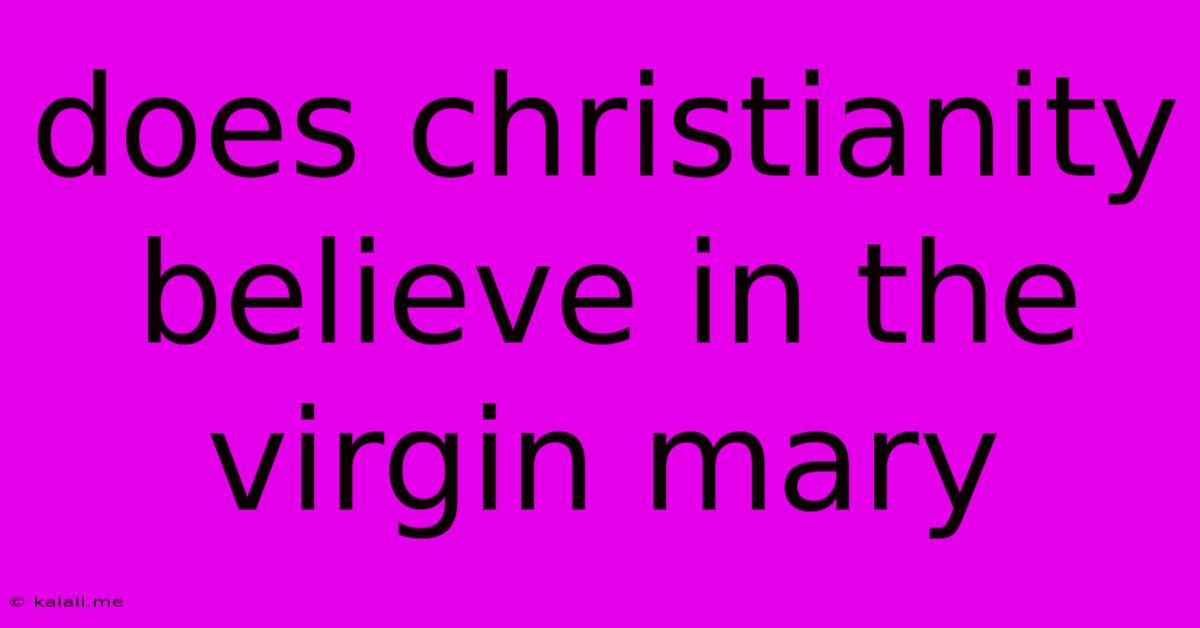Does Christianity Believe In The Virgin Mary
Kalali
Jun 06, 2025 · 3 min read

Table of Contents
Does Christianity Believe in the Virgin Mary? A Deep Dive into Marian Doctrine
The question of whether Christianity believes in the Virgin Mary is a nuanced one. The simple answer is yes, but the how and why are far more complex, varying across different Christian denominations and traditions. This article explores the significance of Mary in Christian belief, addressing common misconceptions and delving into the theological intricacies surrounding her role.
Meta Description: Explore the central role of the Virgin Mary in Christianity. This article examines varying beliefs across denominations, clarifying misconceptions about her importance and theological significance in Christian doctrine.
The belief in Mary's virginity, specifically her conception of Jesus without sexual intercourse, is a cornerstone of Christian faith. This doctrine, known as the Virgin Birth, is central to the understanding of Jesus as both fully God and fully human. It's crucial to understanding Jesus's unique status as the Son of God, born of a human mother yet without the stain of original sin. This belief is supported by scriptural references in the Gospels of Matthew and Luke, forming the foundation of Marian theology.
Mary's Role Across Denominations
While the belief in Mary's virgin conception is largely shared across various Christian denominations, the extent of her importance and the nature of her role vary significantly.
-
Catholicism and Eastern Orthodoxy: These traditions hold Mary in high esteem, venerating her as the "Theotokos" (God-bearer) and recognizing her perpetual virginity. Their theological frameworks encompass a rich understanding of Mary's role in salvation history, including her Immaculate Conception (the belief that she was conceived without original sin) and her Assumption (the belief that she was taken body and soul into Heaven). Prayers, devotional practices, and Marian feasts are integral parts of their liturgical life.
-
Protestantism: Protestant denominations generally acknowledge the Virgin Birth as described in the Gospels but place less emphasis on Marian devotion. While respecting Mary's role as the mother of Jesus, many Protestant traditions focus more on the divinity of Christ and the importance of faith in Jesus's sacrifice. The emphasis on Mary varies across different Protestant branches, with some showing more reverence than others. However, the central tenet of the Virgin Birth remains an accepted doctrine.
-
Other Christian Traditions: Other Christian groups also hold varying beliefs about Mary, sometimes diverging from the mainstream views of Catholicism and Protestantism. The degree of Marian veneration and the specific theological interpretations vary considerably.
Misconceptions about Mary
Several misconceptions surrounding the belief in the Virgin Mary frequently arise. It's crucial to address these to gain a clearer understanding:
-
Mary as a Goddess: Christianity emphatically rejects the idea of Mary as a goddess. She is revered as the mother of God, but she is not worshipped as God herself. The focus remains on the worship of the Holy Trinity: Father, Son, and Holy Spirit.
-
Mary as a Mediator: While Catholics and some other denominations recognize Mary's intercession, this does not imply that she stands between God and humanity. The role of mediator ultimately belongs to Jesus Christ.
-
Mary's Perpetual Virginity: This belief, strongly held by Catholics and Eastern Orthodox, refers to Mary remaining a virgin throughout her life, both before, during, and after the birth of Jesus. This is a distinct theological point of difference with some Protestant denominations.
Conclusion
In conclusion, the belief in the Virgin Mary is a core tenet of Christianity, though its interpretation and the extent of its importance differ among various denominations. Understanding the nuances of Marian doctrine requires careful consideration of the theological frameworks of different Christian traditions and a clear distinction between veneration and worship. The significance of Mary lies not in her own divinity, but in her crucial role in the unfolding of God's plan of salvation, culminating in the birth of Jesus Christ.
Latest Posts
Latest Posts
-
How To Fix An Outdoor Water Spigot
Jun 06, 2025
-
How To Clean Paint Off Hardwood Floors
Jun 06, 2025
-
Pipreqs Missing Parentheses In Call To Print
Jun 06, 2025
-
Should Raw Chicken Have A Smell
Jun 06, 2025
-
Urine Stains Smells Around Toilet Base
Jun 06, 2025
Related Post
Thank you for visiting our website which covers about Does Christianity Believe In The Virgin Mary . We hope the information provided has been useful to you. Feel free to contact us if you have any questions or need further assistance. See you next time and don't miss to bookmark.